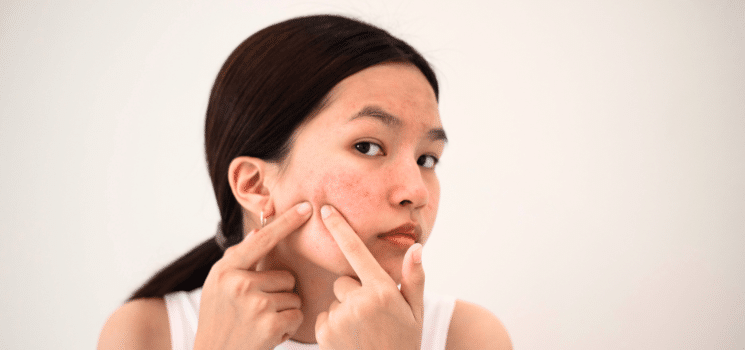While acne is a common skin condition affecting individuals of all ages, understanding the causes and dispelling common myths are essential steps to effectively manage this condition. Dr Kok Wai Leong provides more insights in the following article.
What causes an acne breakout?
Acne occurs when skin pores become blocked by a combination of excess oil (sebum) and dead skin cells. Contributing factors include:
- Excess oil or sebum production
- Production of dead skin cells
- Bacteria overgrowth occurs when oil and dead skin cells clog the skin
- Inflammation of the skin
Lifestyle and personal factors that contribute to acne include:
- Hormonal changes: Androgens are hormones that increase during puberty and cause the sebaceous glands to enlarge and produce more oil or sebum.
- Drugs and medications: Certain medications, such as those containing corticosteroids, testosterone, or lithium can lead to acne development.
- Medical conditions: Acne can also be associated with underlying medical problems, therefore, you should consider a medical evaluation if your acne does not seem to respond to usual products for acne.
- Family history or genetics: Severe acne tends to run in families and you might have a higher risk if your family member has severe cystic acne.
- Lifestyle factors: Lifestyle factors including a diet high in sugars, the use of cosmetic products that may be too occlusive to the skin, and excessive sweating can also influence acne development.
Common acne myths
1. Acne only affects young adults or teenagers
While teenagers and young adults frequently experience acne due to hormonal changes, acne may persist or even begin in adulthood. The latter is termed adult-onset acne and it affects both men and women. In Singapore, the majority of adults who experience acne, only develop acne in adulthood.
2. Acne is a trivial condition and treatment is not necessary
Many dismiss acne as a mild disease. However, acne is a visible disease with invisible complications. Acne can last a long time, and therefore dermatologists treat it as a longstanding (chronic) disease.
3. Acne is caused by dirty skin or a lack of hygiene
Dirt and oil residue can aggravate acne, but you can develop acne even when your face is clean. Washing the face multiple times or scrubbing the skin hard is not recommended and may worsen your skin condition.
When should I see a dermatologist about my acne?
Consider seeing a dermatologist if:
- Over-the-counter products fail to control acne.
- Your acne treatment shows no improvement after weeks.
- You experience side effects from acne treatments.
Early intervention is crucial to prevent severe acne and potential scarring. Addressing acne promptly can also prevent psychological distress associated with poor self-image, depression, and anxiety. If you’re struggling with acne, and over-the-counter products haven’t been working for you, seek professional dermatological advice to achieve clearer, healthier skin. For professional guidance on managing acne, schedule a consultation with Dr Kok Wai Leong today.






